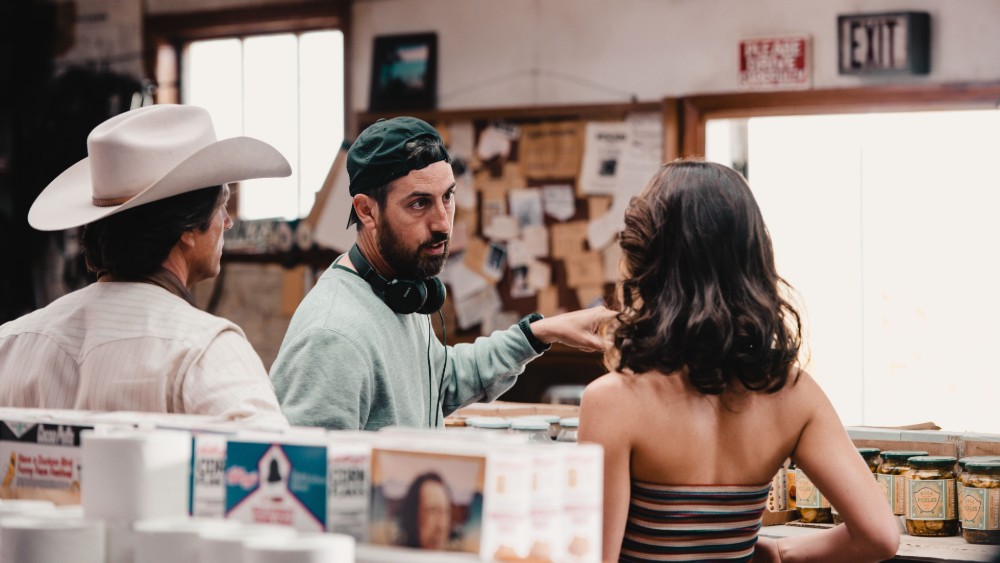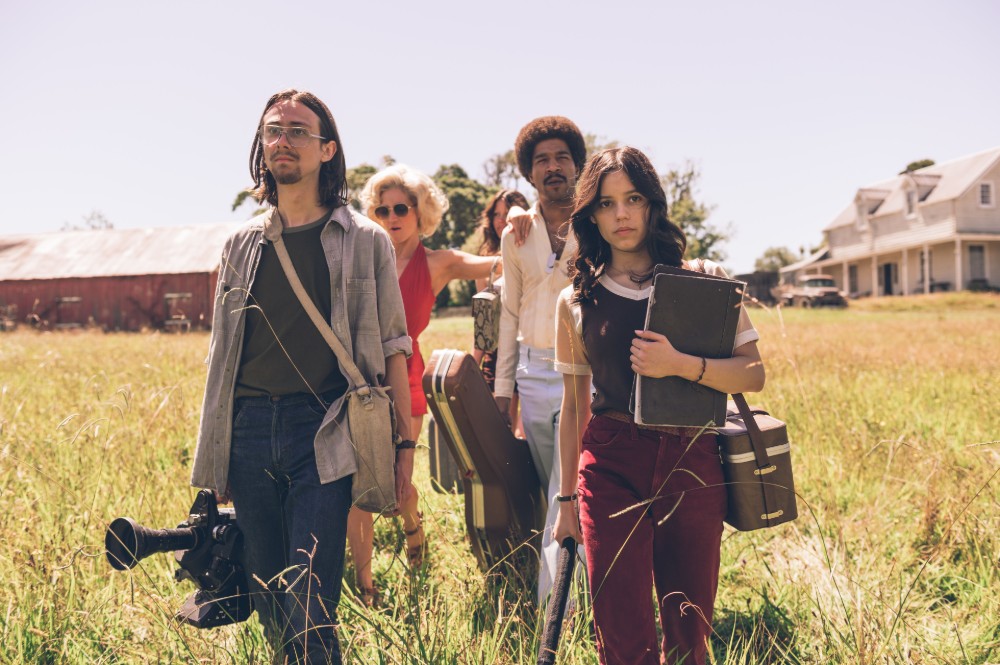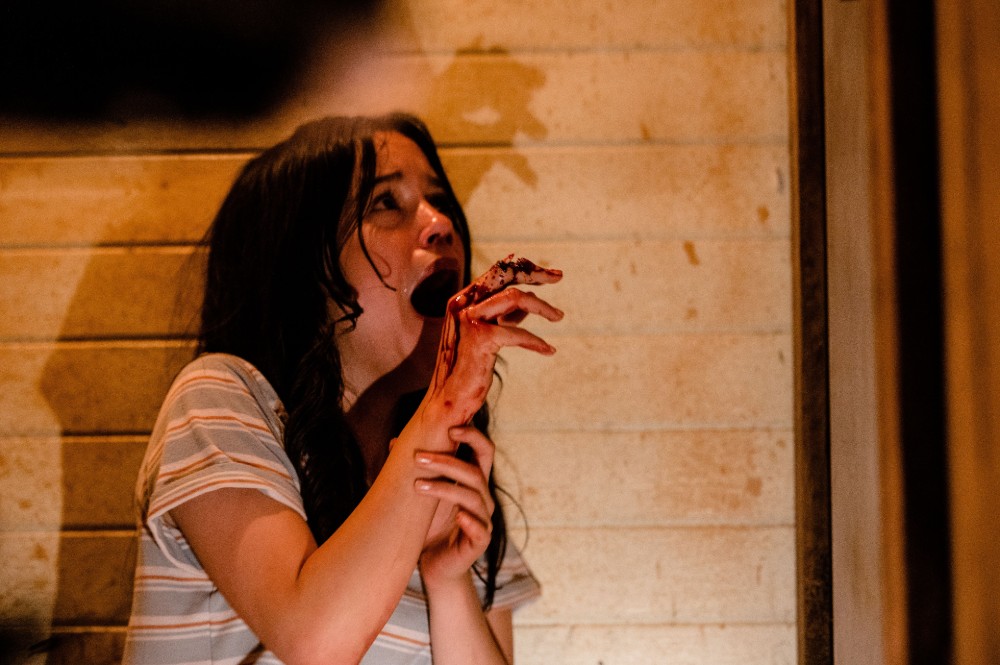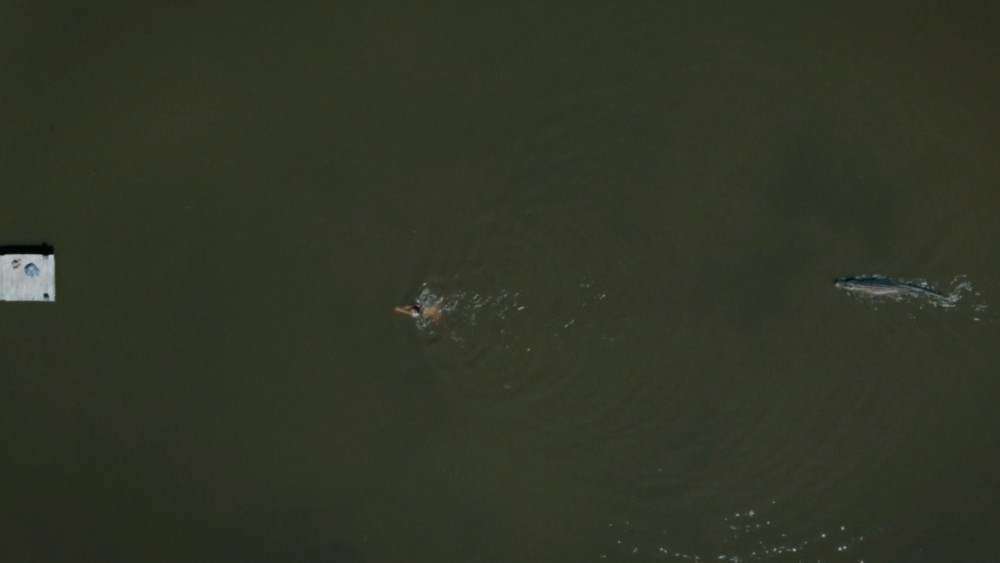
Writer-director Ti West has been doing the “elevated horror” thing since long before A24, the distributor of his new film X, made the subgenre cool.
The filmmaker made a name for himself with his low-budget independent horror movies House of the Devil (2009) and The Innkeepers (2011) before changing things up a bit with his 2013 horror-thriller The Sacrament (produced by Eli Roth and inspired by Reverend Jim Jones) before making a full-on Western in with 2016’s In a Valley of Violence starring Ethan Hawke.
West hasn’t made a movie since then, as he’s been busy directing episodes of Amazon shows such as Tales From the Loop and Them. But now he’s back in theaters with X, an absolutely bananas horror movie set in 1979 that follows a group of young, pretty people who set out to make an adult film at a time when porno movies were really starting to explode.
Leading the project is Martin Henderson’s gregarious producer Wayne, along with his ingénue and girlfriend Maxine (Mia Goth), and the film’s stars Jackson (Scott Mescudi,) and Bobby-Lynne (Brittany Snow). Writing and directing the film is the ambitious RJ (Owen Campbell), who has brought his meek girlfriend Lorraine (Jenna Ortega from this year’s Scream) along to hold the boom mic.
When the group arrives at their planned location — a remote farmhouse, naturally — they know full well that the elderly puritanical owner who rented them the space (Stephen Ure) is unaware of their X-rated intentions. They also discover there’s something much darker and deadlier than his ire once the old man learns the truth about their home movie.
When Below the Line spoke with West a few weeks ago, the director explained why he deliberately spent the past several years directing so much television, and what compelled him to return to his horror roots. And though we didn’t cover it in this interview, West recently announced that he has already wrapped a prequel to X titled Pearl. Who’s Pearl? Well, you’ll have to see X to find out. Until then, here’s our chat with West:

Below the Line: It’s been a while since we last spoke, probably for In a Valley of Violence. I think I gave you a hard time about it having been three years since your previous movie, and you said that you’d make your next movie much quicker. That was six years ago. I know you’ve been busy directing television during that time, but was X something you’ve had in your back pocket and were just waiting for the right time or financing to make it?
Ti West: No, it came together very quickly. After The Sacrament, I had wanted to take a break from horror movies, because I’d made seven of them in a row. I didn’t want to repeat myself. I made In a Valley of Violence, and then I didn’t know what I was going to do after that. By the time Valley of Violence was done, I had gotten called to do a TV show. In the 15 years of my career, up until that point, no one had ever offered me anything before. The idea that someone actually wanted me to do something, I was just so charmed by that, I was just so grateful and happy to say ‘yes,’ [so] I went and did that, [and] I had a really great experience.
Because I did everything myself for so long, independently making movies, the constraints of TV, of not having enough time and money, were not a problem for me. Often times, it’s a problem getting into TV and getting overwhelmed by the craziness of the production. I think I was well-suited for it, and I was also really happy to meet these showrunners and creators of these shows. They’re all stressed out because they’re trying to manage 10 episodes of the show, and I was like, ‘Whoa, you’re me in my other life. How can I help?’ They would say, ‘We want it to be like this,’ and I was like, ‘I could do that for you.’ And then I could do that, and I thought, ‘This is a really different kind of job than making my own movie, but it’s like, really cool.’
And then, I got an opportunity to work on a lot of shows in a short period of time and work with a lot of people. I didn’t hire any of these people, I didn’t cast these people, so I’m dropped into work with people that I don’t know, and you get all this experience working with different kinds of personalities and different kinds of equipment. I felt like I was really sharp from a craft standpoint, from doing so many reps on set, that I felt kind of ready to make a movie again.
I started to have an idea for a horror movie, and was thinking a lot about what I liked about horror movies and movies in general. I realized that for me, the cinema, the craft of it is a big part of it, so I wanted to make something that brought the audience into that. I want to make a movie on people making a movie, and then, the movie came really quickly from there.
I wrote it in like a month, and I call A24, because we had always threatened to make a movie together. I sent them the script and said, ‘Look, no one knows I wrote this. This might be too much for you guys. It might be too out there, but let me know. Maybe we can make it.’ They call back, and they were like, ‘We want to do it,’ and that all happened very quickly.
And then the pandemic happened, and we pumped the brakes on it for a while, and then we sorted that out, and off we went. I knew I wanted to make a movie, I wrote it really quickly, and then the only people I sent it to was A24. If they had said, ‘No,’ I don’t think I would have made it. I would have just done more TV. They wanted to do it, and here we are.
BTL: I didn’t think “too out there for A24” is even possible. So you shot the whole movie in New Zealand. Had the pandemic already hit there, or did that country’s notoriously tight lockdown protocols make it the best place to shoot the film?
West: It was probably February 2020 that we were like, ‘We’re making the movie,’ and then the whole world stopped. It didn’t look realistic to make the movie in the States in the summer, and it needed to be in the summer. I was like, ‘We’re gonna have to push this a year,’ and A24 didn’t want to wait a year, and I flippantly suggested we would go to the Southern Hemisphere and just chase the summer, and they said, ‘Okay.’
We looked at New Zealand for a couple reasons. One, it’s in the Southern Hemisphere. Two, Weta was there, and I knew it was gonna be a heavily prosthetics-driven movie. At the time, it was COVID-free, so if you went, it was a very safe place to make a movie, because this movie could not really be made with social distancing [given] the nature of this movie. Under the weight of COVID protocols, I don’t think we could have gotten the performances — it just wouldn’t have worked, and it wouldn’t have been worth doing. So we looked into it, and I was like, ‘We’re never gonna find a farm that that’s gonna look like [what we need]’… and then we did. So we said, ‘What if we went to New Zealand?’ And next thing you know, we were in quarantine on our way to New Zealand.

BTL: Did you find a location with the three main buildings of the farm, or did you still have to build stuff and do set decoration?
West: Obviously, if we could find that, that’d be great. If we could have found the house, we would have been okay, so we found a house, and then we built the barn, and we built the bunkhouse.
BTL: A lot of people are going to make the Texas Chainsaw Massacre comparison, partially due to the location, but also you have the famed shooting through the screen door from down the hall shot. I’m not sure if Tobe Hooper invented that, but it’s very reminiscent of a famous shot in his movie. Would you agree?
West: I don’t know. It’s funny, because when I framed that up, I wasn’t framing that being like, ‘We’re gonna do a [Texas Chainsaw Massacre],’ but when I looked at it, I was like, ‘This only looks like one thing.’ There was nowhere to put the camera in this house that actually was the house, that isn’t going to look like this, so let’s just embrace it.
BTL: I do like talking to directors about the craftspeople they choose for a project. Obviously, Graham Resnick is someone you worked with doing sound design from the very beginning, but what about the production designer, Tom Hammock? I know he has worked with Adam Wingard a lot.
West: The production designer I usually work with, Jade Healy, she was doing Peter Pan with our friend David Lowery, and Tom, who’s amazing, we had just done a television show together. We probably hadn’t seen each other since, maybe, You’re Next, and then we were doing a television show together, and he was on it, and this movie was coming together. I knew Jade wasn’t around, and I was like, ‘Hey, would you be interested in coming to do this?’ and he was super psyched. And Tom’s a genius. Just like Jade — they’re both amazing, so it was a no-brainer, and I was just happy to reconnect with him and get to do it, and he did an amazing job.
BTL: You also reunited with your DP Eliot Rockett who had shot some of your earlier movies.
West: Elliott is someone that I wanted to work with again, because it had been a few years, Elliott lives in Portland, and he was a DP on the show Grimm that shot in Portland. We sort of took a break, because it’s not all too often that a show comes to Portland for six seasons. So he started doing Grimm and then just became in that world. That show had ended coincidentally, maybe six months before we were going to make this movie, so he suddenly became available again, and I was like, ‘We should catch up and we should make this movie.’
BTL: As you said, there are a lot of prosthetics involved. I wasn’t really familiar with Stephen Ure, and I didn’t even recognize Mia as his wife, since she was covered in a ton of prosthetics as well. How did you work with Weta in creating those?
West: Because the goal was always to get Weta involved, they understood how big of a challenge it was, and they understood the references, obviously, and they knew. It was like six-and-a-half hours of makeup every time she was Pearl, and it was these very, very, very, very thin appliances. I mean, they were like, two millimeters thick. Because I didn’t want it to look fake even though I kind of treated the older characters like monsters in a monster movie, but I still wanted them to be humans and not actually monsters, so it was a really fine idiosyncratic line.
They were just really excited to do that, and they were excited to do practical gore effects, because obviously that’s in their past with Peter Jackson. They’ve done so much of that, and Richard Taylor and everybody there was really great and excited to do it. Our onset makeup artist, Sarah Rubano, is like a genius, so yeah, part of the ambition of making a horror movie and a slasher movie and what I love about the craft of them is special effects makeup, so I wanted to do something that was really a little show-offy with that.
BTL: Mia has done horror before with Gore Verbinski’s A Cure for Wellness, which I absolutely loved. Can you talk about some of the other actors and convincing them to do what’s involved with making an X-rated movie within the movie?
West: When I met everybody, actor-wise, the first question I asked everybody after an audition or in a meeting was, ‘Why the hell do you want to be in this movie?’ Horror and porn, it’s not the most appealing sounding thing. Also, people could have an idea in their head of what the movie is, and it’s not accurate to what it actually was. I was just interested in why anyone would want to be in the movie. Everyone that ended up in the movie had a really compelling answer, and in most cases, their answer had to do with some real drive and ambition.
Like, Mia, for instance, was really inspired by the challenge of playing two roles. Brittany [Snow] had an opportunity in the past to play something against type that she didn’t do, and it was always kind of nagging her that she didn’t do it. She really wanted to go, like, 100% on this, and she was like, ‘I just feel like this is a great opportunity for me to really go hard in a way that I don’t get other opportunities to do.’
Jenna was the same. Everybody had this unique ambition of why they wanted to be in the movie, which I think was a good parallel to the characters in the movie who have their own ambitions in making the movie. They’re all amazing actors, and they were all my first choices, but it was really just sort of like, I believed they really wanted to do it, and I believe they believed in the movie. The wrong way of thinking about this movie was sleazy and nihilistic and gross. The right way of thinking about this movie was funny and upbeat and like crazy. They got that.
Sometimes people would audition for Wayne, for instance, and it would be slicked-back hair with gold chains and a toothpick and it’d be really creepy. I guess I could see how you could imagine that movie, but I’m so not making that movie. I’m making like the football coach turned entrepreneur Wayne. I think Martin Henderson, he immediately got that — it was no explanation needed. For everybody in this movie, they needed to get the vibe of the movie intrinsically, and then they needed to fit together because it’s an ensemble, so that they could tease each other and you could believe that they were friends, because you had to be charmed by the characters, so that it wasn’t just a movie about a body count.

BTL: It was great to see Martin in this, and I hope he gets more work out of it. I’ve never been to New Zealand, so are there actual alligators down there?
West: That was our Jaws — we had great alligator puppets.
BTL: I wasn’t sure if you just had great puppets or just a very talented local wrangler who found alligators that could behave the way you needed them to.
West: I don’t know if you could. Maybe if we made it in Louisiana, but no, we just built these really amazing puppets.
BTL: I’m not sure what the timeframe was for the movie, but did you stay down there to do all the post as well?
West: I did stay down there and do post. I left on Halloween of 2020, and then we started shooting. I can’t remember the date, but early February, and then I did post there as well. Because once I was there, it was like, ‘I might as well stay.’
BTL: Did Graham come down there to do his part or did you just work with him remotely?
West: We did the sound back here [in L.A.]. So I came back, and we mixed here and did the sound design here.
BTL: I would like to talk more about the TV stuff you’ve been doing. Have you directed any pilots yet?
West: No. Seriously, I don’t have a huge interest in doing pilots. I’d much rather do an episode in the middle of a series.
BTL: Have you been approached to direct any pilots?I think at one point you told me you were doing your own show as well.
West: Yes, I would be interested in doing my own show, but as far as pilots… I mean, I’d never say never, of course, but doing a pilot is really to take on a tremendous amount of responsibility on a series that is not necessarily yours. To do episode whatever is to come in and try to help them make the best version of the show they’re doing. That, to me, is appealing.
I’ve made my own movie, so this idea of establishing the tone for a show, personally speaking, doesn’t do that much for me. I would just make my own movies where I go establish a tone for a thing. My interest in TV really is like getting dropped into the middle of something and trying to think on my feet and make — in my own way, hopefully — one of the best episodes of the show and trying to… whatever they’re trying to accomplish with the show, get as close to that as possible and then be like, ‘Alright guys, I’m out of here.’
That’s what I love about TV, is just kind of coming in, hopefully making it better than they thought it could be, and achieving what they want, because I know from the creator’s standpoint, they have an idea of what they want and not everyone’s going to nail that. I’ve tried to understand from them what they want and try to do that, because I really look at it as this great way to help, and for me to just learn stuff on set. And then, if I want to apply that, I can do that in my own movie.
BTL: I’ve spoken to Guy Ritchie, who obviously also writes a lot of his own material, but he also doesn’t like not being on set for a long time. I know you write really fast, so do you have that same desire to be on set as much as possible?
West: The funny thing about movies is that whatever thing you’re doing, you wish you were doing the other thing, [so] if you’re on set, you wish you were back writing. For me, I looked at it like… directing is a funny thing, because whether you’re setting up a shot, using a piece of equipment, or trying to tell an actor articulately what you want them to do differently, or specifically… even if you do this for a career, you don’t get to do that very often. Even if you’re amazingly prolific, you’re doing that once a year. Doing something once a year is very difficult to get very good at it unless you add a shitload of years. If you want to tell an actor how to do something, and it’s your first movie, how good are you really going to be at doing that?
By doing TV, I have to talk to all these actors all the time, who I don’t know, and I didn’t cast, and I better get very good at articulating what I want, specifically. So as not to confuse anyone, or whatever. The reps of being able to do that, I’m just much better at that. Same thing about any element of the filmmaking process. So TV is a really great opportunity to practice that, for me, [and] that’s why I just like doing an episode and why I just want to help them, because I feel good about that. And then for me, what I get out of it is, well, I just get better at filmmaking, because I’m putting a lot of time in. Even if I made my own movie, it’s once a year. I can do six TV shows in a year, and they’re all an hour long, so it’s not that different from making a movie.
BTL: I know we have to wrap up, but I know you do most of your own editing, and I think you worked with another editor on X as well, but there’s this interesting thing we see a few times where you foreshadow an upcoming scene with a static shot, like the cows, and then cut back. You do that a couple of times. Was that something you were doing to reference something else you’ve seen? Because it was pretty interesting…
West: It was a combination of two things. It was a little bit of a reference to RJ [Owen Campbell’s character] talking about trying to add a bit of avant-garde editing, and then, it’s probably a nod to Easy Rider.
BTL: Well, there you go. Ti, it’s great seeing you again. Hopefully, we’ll talk again in less than six years. I don’t want to jinx it.
West: I can confirm this. You will.
X opens in theaters nationwide on Friday, March 18, with previews starting on Thursday night.





